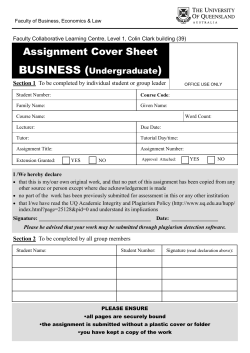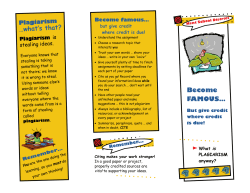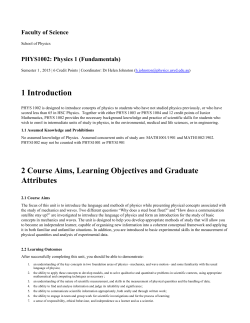
Criminal Justice I
Criminal Justice I Mr. Concannon Smith Email: Benjamin_Smith@wrsd.net Website: www.BenjaminAllenSmith.com Twitter: @BACSmith Course Description: This course has two goals. The first is to provide students with an overview of career options and fundamental principles of Criminal Justice. The second is to shape your critical thinking abilities via a regimen of rigorous reading and writing. Major units of study will include Criminal Justice Careers, The History of Law, History of Law Enforcement, The Court System, Criminal Law, Investigations, and Case Law. There will be guest speakers from law enforcement organizations and students will be required to attend field trips to law enforcement agencies. Essentially, I want to familiarize you with the kinds of questions that criminal justice professionals ask and expose you to how they think. To be sure, this in not a class oriented toward training you to become a police officer. Rather, I want to help you build intellectual skill-sets that will help you succeed in the real world, no matter the field. Y OU MUST ACHIEVE A GRADE OF “C” OR HIGHER IN ORDER TO ADVANCE TO C RIMINAL J USTICE II. Objectives: Students will be able to: • Demonstrate understanding of the historical significance of crime and punishment in the United States • Demonstrate the ability to use comparative perspective to synthesize a source’s relevance/worth/biases etc • Demonstrate the ability to critically analyze primary and secondary sources and work collaboratively with peer students. • Communicate ideas effectively in written, oral, and visual communication • Utilize technology to research, compile data and convey conclusions both individually and as part of a group Grades and Policies: Quarterly Grading System: Each academic quarter students will receive a grade based on the TOTAL POINT SYSTEM in the following areas: Tests Homework PDPs (Primary Doc Project) Quizzes Participation and Preparation Total Grade for Quarter 100+ points each 10-20 points each <100 points 50-75 points each 3-5 points each earned points/total possible Semester Grades and Final Grade Midterm Examination At the end of the second quarter, students will complete a mini-research paper that will fulfill the midterm examination requirement. It will carry 20% of the weight towards the “Semester 1 Grade.” 1 Final Examination At the end of the fourth quarter, students will complete a mini-research paper that will fulfill the final examination requirement. It will carry 20% of the weight towards the “Semester 2 Grade.” Semester 1 Grade Q1 Grade (40%) + Q2 Grade (40%) + Midterm Paper (20%) Semester 2 Grade Q3 Grade (40%) + Q4 Grade (40%) + Final Paper (20%) Final Grade Q1 (20%) + Q2 (20%) + Q3 (20%) + Q4 (20%) + Midterm (10%) + Final (10%) Rules and Expectations: Come to class prepared to learn (this will impact your “Participation and Preparation” grade). This means with homework and readings completed and contemplated. It will be very obvious to me if you did not do the reading or an assignment thoughtfully (or scrambled to complete it in a different class). In order to do this you must: 1. Arrive to class on time 2. Bring a notebook, and a pen or pencil to class each day (I also recommend purchasing a binder or folder for course handouts) 3. Look for a “Do Now” prompt on the board and complete it if there is one 4. Put learning ahead of getting good grades 5. Keep an open dialogue with the teacher Participate in Discussion and Activity (this will impact your “Participation and Preparation” grade) 1. Show respect for the teacher, yourself and others at all times. 2. Raise your hand when you want to speak and listen to others when they are speaking. 3. Respect others’ property. Avoid touching or writing on anything that does not belong to you (including desks, textbooks, teacher’s belongings, walls, chalkboard, etc.). Do not expect others to clean up your mess. Please pick-up after yourself. 4. Follow school procedures for appropriate language and appropriate clothing. 5. Just be a kind person. Academic Honesty (please read this section carefully and note the policy from the WRHS Handbook redundantly added to the “Department and School Policies” section below) This course has zero tolerance for cheating. Any written work that infringes on the district plagiarism policy will receive a “0” grade and will be given extra weight in calculating the final grade for the course, which makes failing the course nearly certain. The same rule applies for test taking. See a description of plagiarism below and visit the link for more information:1 “If you present someone's words, thoughts or data as your own, you are committing plagiarism—you are stealing. The location of the information is irrelevant: when it comes to plagiarism, information from the Internet is equivalent to information from a physical book or journal. To avoid plagiarism you must cite the original author every time you: Definition from The University of Pennsylvania’s Library Page (accessible here: http://gethelp.library.upenn.edu/PORT/documentation/plagiarism_policy.html) 1 2 • • • • Use an author's exact written or spoken words. In this case, you must also identify the words by enclosing them with quotation marks or indenting the quote on both sides of the margin. Paraphrase someone's written or spoken words Use facts provided by someone else that are not common knowledge. Make significant use of someone's ideas or theories. It is also plagiarism to hand in someone else's paper as your own, or cut and paste text from the Internet to your paper without citing the source.” Department and School Policies: In order to create and maintain a positive academic environment, transparency and is important. Therefore, I want to make it explicitly clear that I WILL enforce these rules without exception: Foster WRHS Core Values: Citizenship and Responsibility, Collaboration, Communication, Critical Thinking and Problem Solving, and Creativity and Innovation Department Homework Policy Homework in Social Studies will: 1. Reinforce critical reading and writing skills. 2. Support and expand on information presented in class. 3. Involve studying material central to the understanding of social studies concepts. Homework will be assigned regularly in all social studies classes. Social studies teachers expect homework to be neat, on time, original, and complete. Tardy Policy and Missed Work 1. If you are late to class THREE times (under one minute late) you will receive a detention on your third offence. If you are late to class ONCE (over a minute late) you will receive a detention each time. See page 7 of the student handbook for more details. Tardiness will also negatively impact your participation and preparation grade. 2. If you are absent YOU are responsible for finding the assignments you missed in the assignment bin for that weekday. However, late homework will only be accepted for students with EXCUSED absences. If your absence is UNEXCUSED, you will not receive credit for work you missed. See page 2 of the handbook for details on excused absences. a. You must hand in late work no later than the 3rd day after your absence in order to receive credit. VIOLATIONS OF ACADEMIC INTEGRITY (see my personal application of this school policy in the my section on “Rules and Expectations”) 1. All students’ academic work must reflect their own honest efforts. Cheating and plagiarism in any form will not be tolerated. This includes, but is not limited to copying homework, papers, lab reports, or quiz or test answers; acquiring or disseminating quizzes or tests before they are administered; or using information from the Internet or other outside sources without proper attribution. 3 2. Any student known to have cheated will be subjected to penalties, up to receiving “0” for the work. Possible penalties will be made known to each class by the teacher and will be included in the course syllabus. 3. Students who collaborate with others in cheating by allowing their papers to be copied or by other means will be subjected to penalties commensurate with their involvement, which may include the student receiving “0” for the work or suffering significant grade reduction. 4. In all cases, the principal or the class administrator along with the department head and teacher will be informed about both the incident and the penalty imposed, and the parent(s) or guardian(s) will be notified. The administration reserves the right to impose other penalties up to and including removal from the course, removal from honor societies, and loss of eligibility for scholarships with “honor” as criteria. Field Trips and Service Learning 1. I understand that some of you may have extracurricular commitments, however attending these service-learning trips is extremely important. Thus, if you are playing involved in an athletic/afterschool endeavor that may conflict with these events and you value athletics more than academics, I suggest you reconsider your enrollment in this course. Routine absences on fieldwork days will drastically lower both your homework grade as well as your participation and preparedness grade making nearly impossible to pass the course Description of Assignments: Tests There will be a minimum of two tests per quarter. Tests will reflect the units covered in each quarter. I hold a study session the day before each test and will provide all students with a study guide at least one week prior to the test date. The study guide will explain the format of the test as well. Homework: You can expect homework regularly and it will always be posted the whiteboard under the homework section. I will regularly use Twitter to post reminders. The type of work will vary (reading, posting to blogs, listening to podcasts, watching a piece of a documentary) and you will not be expected to hand something in for every assignment (meaning you will not have to do written work every night). I assure you, I am not doing this to be kind, but rather to prepare you for college. In college, you need to manage your time wisely and you will be expected to follow along with the course content without regular “check-ins.” Thus if you skip readings because there is no written work that goes along with it, you may regret doing so when it comes time to take the examination. I often assess if you’re doing the nightly readings in the form of a “do it now” activity that must be completed and passed in at the beginning of class. If the DIN activity addresses the HW it will count both toward your Participation and Prep grade as well as your HW grade. Quizzes are also a suitable way to make sure you are keeping up with the reading. Class Participation: Class participation is measured in a variety of ways. The basic idea is to measure your active engagement in class day-to-day. Activities that count toward CP include but are not limited to: “Do Now” activities & exit cards, blog discussions (out side of class), and certain in class activities. Individual CP grades range from 3-5 (think about it like a check-/check/check+ system). A zero is reserved for those that do not do anything (which is unacceptable). 4 Quizzes: Personally, I do not believe in “pop quizzes”. I will notify you at least one day before I give a quiz. This does not mean that the quiz will only cover that night’s homework. In fact quizzes will often be given towards the end of the week and cover the weekly readings. They will not be difficult IF you have done the reading. These are great way to cushion your grade, so I suggest you take advantage of them by keeping up with the reading. Primary Document Assignment: Occasionally, you may have to complete a primary document project. This will involve choosing a document or source from a list to be provided OR finding a different source that relates on your own and clearing it with me. You will read/dissect it analytically, and write a short 3-5 page paper explaining: • • • the content, scope and argument of the source context and how this source relates to the material we have covered thus far what you wish to convey to your fellow students about the document (what did you learn from it and what are the main takeaways) This will be graded with a slightly modified version of the APPARTS department rubric (to be handed out with the assignment). Please consult as much writing help as possible. Boston College offers sound advice for their students that can be found below, though there are many other academic institutions that put forth tips for writing research papers: http://www.bc.edu/schools/cas/history/resources/tips.html - needstodo Extra Help: I wish to be as accessible as possible. If you need extra help, please do not hesitate to email me or talk to me after school to set up an appointment. Tell your parents to do the same. I think this covers everything!2 -------------------------------------------------------------------------------------------------------------------------------------- NOTE TO STUDENTS AND PARENTS: YOU MUST COMPLETE THE ONLINE FORM CONFIRMING THAT YOU HAVE READ THIS SYLLABUS CAREFULLY AND UNDERSTAND IT COMPLETELY. Email basmith1776@gmail.com Follow these instructions: 1. 2. 3. 4. 5. Go to: www.BenjaminAllenSmith.com Click on your class link under WRHS class links Click on “Syllabus” Read syllabus with parent. Complete the form accurately. This will count as the first Homework Assignment grade of the academic year. I use email as my primary method of communication with both students and parents. I use the information from the form to set up an email group for the students in this class and for parents. I encourage students to use Gmail accounts (provided by the district). 2 Note: The instructor reserves the right to make changes to this syllabus if necessary 5
© Copyright 2025
















